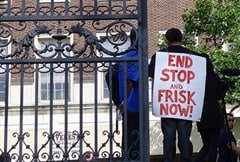New York City Police Department policeman Adhyl Polanco describes in a Democracy Now report and interview the corrupting and rights abusing quota system for stop-and-frisk, summons, and arrests in the largest local police department in the United States. Among other revelations, Polanco estimates that, but for the improper encouragement of stop-and-frisk by the city government, police department, and police union, about 600,000 of the around 700,000 police initiated stop-and-frisk incidents last year would not have occurred. Polanco adds that some police will arrest “whoever’s at the corner” near the end of a work shift to meet the quota plus receive overtime pay.
Polanco proceeds to explain that police are forced to understate actual, reported crimes to ensure the city’s crime statistics improve. Proponents of stop-and-frisk can then point to the manipulated crime statistics to support the claim that the stop-and-frisk policy is reducing crime.
Particularly gripping is Polanco’s description of the day he decided he had had enough:
We would stop a person on the street and on a corner, because the sergeant says, “Stop him.” Why? You don’t ask. You just stop him, you frisk him. If it’s possible, you search him. And these kids, sometimes they’re just walking home from school. They’re just walking to the store. They’re just—they’re not doing absolutely anything. They’re not doing absolutely anything. And it’s a really humiliating feeling. When they go through your pockets, when they stop you, you don’t have no freedom. If you stop and then tell the officer, “I’m not—I don’t have to give you my ID. I don’t have to give you my name,” which is within the law—the law allows you to do that—you’re going to get hurt. In the Bronx, you are going to get hurt.
My turning point was with a bunch of kids on a corner stopped by the commanding officer. There was a 13-year-old Mexican in the group. “Polanco, cuff him.” I said, “For what?” “Cuff him. You don’t ask me questions. Cuff him, bring him back.” His brother come to ask, “Why? What’s going on with my brother? He’s walking home from school. Officer, did he do anything stupid?” The commanding officer looked at my partner, told her, “Cuff him, too. Bring him in.” “For what?” “Oh, we will figure it out later. Just bring him in.” And that was my turning point. That was the time I said, “You know what? Why should I do it to a kid that’s just walking home from school, that we know is not doing anything? Why should I do that? This is not what I became a cop for. This is not what I wanted to do.”
I live for my kids. And I think of them. I think of them one day being slapped by a cop, like it happens so many times on the street. I’m thinking of them being handcuffed and screaming to the cop, “I haven’t done anything! I haven’t done anything! What are you—why are you arresting me? I haven’t done anything!” I don’t want them to go through that.
While Polanco has managed to stay employed at the NYPD, the police department has not made things easy from him. Polanco explains:
But then they—about a year ago, they sent me to—I live in Rockland County. They sent me to Utica Avenue in Brooklyn, where I drive an average of five hours a day to get to work. It’s called “highway therapy.” And I pay five tolls every day to go to work.
Watch and read the transcript of the 26 minute report and interview here:
Meanwhile, forces behind the stop-and-frisk policy are scrambling to limit judicial action related to the police department. Outgoing mayor and proponent of the city’s stop-and-frisk policy Michael Bloomberg is asking a US appellate court to vacate, prior to his term’s completion, a yet to be implemented US district court order that places restrictions on the operation of stop-and-frisk and appoints a monitor of the program. Also, the police union is seeking to intervene in the case so the union may continue the appeal that Mayor-elect Bill de Blasio, who takes office January 1, desires to abandon.
Interestingly, New York Times writer Jim Dwyer reports that the supposedly important expanded use of stop-and-frisk has dropped dramatically as the lawsuit progressed:
In the first three months of 2013, 99,788 people were subjected to stop-and-frisk encounters in New York City; a year earlier, 203,500 had been. So the practice has been reduced by more than half. Crime is dropping. The world has not ended.
Call it a retreat by the city, or, as the Police Department describes it, better training of officers. The change began about 18 months ago when the city was heading toward the big class-action lawsuit.
With the exit of Bloomberg as mayor, there is hope the New York City government will completely do away with the stop-and-frisk policy and related corruption in the NYPD. Such a change in the largest local police force in the US will respect the rights of the millions people residing, working, and visiting in New York City each day. It will also serve as a good example for other police departments.
Flickr/williamaveryhudson

